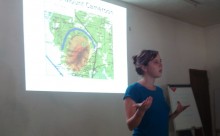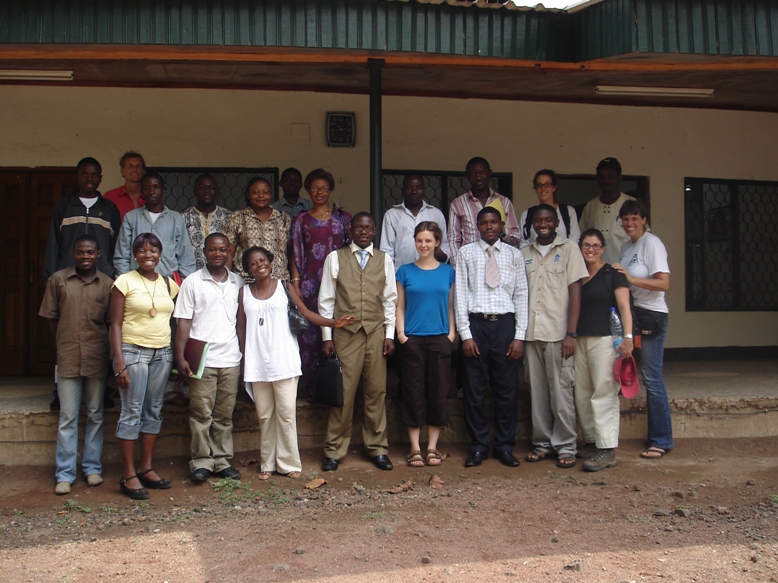You can call me Al
At this year's UNFCCC Conference of Parties in Poland, activists stood outside the proceedings in polar bear suits, holding signs that read "I am so sick of wearing this polar bear suit." As veterans of the struggle against climate change, they were growing weary of the bear, which has become the most recognizable and charismatic symbol for the crisis of a changing planet. Indeed the symbol is ubiquitous; poke around on the One Sky page long enough and you'll see him here too, offering up tips on how to use less energy. (Hi Slushy!)
So let the record show that way out here, in the thick air of Congo Basin, the polar bear also lives, sweating out his woeful stories of non-linear melting rates and gross government inaction, to an enthralled audience. Never mind that in this case his polar bear "suit" consisted of a white sheet draped over a Dutch lady with less precision then a toga, or that the "gorilla" he conversed with wore the same sheet only in black.
I have been delivering a series of workshops: "What does climate change mean for Cameroon?", most recently in partnership with the Limbe Wildlife center, who were delightful enough to provide the theatre event, not to mention rice and beans for 40. The workshop was attended by university students, NGO workers, journalists and concerned citizens.
In this case we used clips from Al Gore's famous "Inconvenient Truth" to underline some of the basic causes and consequences of climate change, while re-contextualizing the information in a way that was relevant to Cameroonians. It was an interactive day with ‘true or false’ games, tours of the primate sanctuary, and plenty of discussion.
I was delighted to see that while people came to the workshop with very little prior knowledge about global warming, which has not penetrated public discourse here, all were very well informed when it came to deforestation, and easily intuited the connection between forest conservation and a stable atmosphere.
After all, what exactly *does* climate change mean for Cameroonians? Even the worst predictive models only forecast a temperature rise of 1c around the equatorial tropics, abundant rainfall places the desertification dilemma squarely in someone else's back yard, there's no hurricane belt, and high mountains protect them from the specter of a rising sea. Certainly no one would suggest that Cameroonians, with their effortless organic 100-mile diets and their low-impact transportation, should be reducing their own carbon footprints - that is our job.
But what Climate Change does mean for Cameroon, and why I believe so firmly in the importance of raising local awareness of this topic, is that the value of Cameroon's most precious resource, its ancient rainforests, is being altered dramatically in the wake of an emerging international market in carbon credits.
"Avoided Deforestation" schemes such as REDDS, whereby forest stakeholders are compensated in return for *not* cutting the forest down, are beginning to appear all over the Cameroonian landscape. These could potentially offer a reasonable livelihood alternative to the very unreasonable notion of razing the forests. But how will valuing land based on the amount of sequestration rather than the amount of timber alter the incentives and behaviors of land users? And how participatory could the planning of REDDS projects be with a population who has not been informed about CO2?
During discussion, participants brought up issues ranging from international justice and inequity to the population boom, but particularly the need for more public education. On that note we decided that an annotated version of the slides I had used for my presentation would be made available for anyone who could cough up a USB key (Al Gore makes you pay for his). At the end of the day, nearly everyone took down my email address, so that they could get the slides, re-inform themselves and pass on what they knew to those around them.
I believe this is a good thing.
Jane Boles




Posted by: .(JavaScript must be enabled to view this email address) on 06/16 #
At the end of the day, nearly everyone took down my email address, so that they could get the slides,impact transportation, should be reducing their own carbon footprints - that is our job.